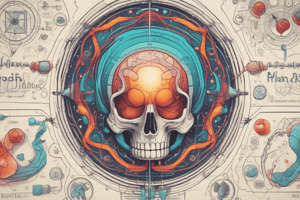Podcast
Questions and Answers
Which of the following factors can lower a person's pain threshold?
Which of the following factors can lower a person's pain threshold?
- Healthy diet
- Past experience (correct)
- Genetic predisposition
- High physical activity
Opioid tolerance leads to a stronger effect of the same dose of an opioid agonist.
Opioid tolerance leads to a stronger effect of the same dose of an opioid agonist.
False (B)
What age group is generally more sensitive to experimental pain compared to younger adults?
What age group is generally more sensitive to experimental pain compared to younger adults?
Older adults
An individual’s expectation can significantly alter both the perceived pain intensity and ______ patterns during painful stimuli.
An individual’s expectation can significantly alter both the perceived pain intensity and ______ patterns during painful stimuli.
Which of the following genetic factors has been suggested to influence pain sensitivity?
Which of the following genetic factors has been suggested to influence pain sensitivity?
Match each demographic with their pain response characteristics:
Match each demographic with their pain response characteristics:
Culture does not play a role in how individuals respond to pain.
Culture does not play a role in how individuals respond to pain.
What psychological conditions can impact a person's pain perception?
What psychological conditions can impact a person's pain perception?
What does the 'P' in the pain assessment acronym stand for?
What does the 'P' in the pain assessment acronym stand for?
Placebos should be used to assess or manage pain according to the American Society of Pain Management Nurses.
Placebos should be used to assess or manage pain according to the American Society of Pain Management Nurses.
What are the four aspects of assessment for a client experiencing pain?
What are the four aspects of assessment for a client experiencing pain?
The 'S' in the pain assessment acronym indicates _______.
The 'S' in the pain assessment acronym indicates _______.
Match the following pain characteristics with their definitions:
Match the following pain characteristics with their definitions:
Which of the following is NOT a physiologic response to acute pain?
Which of the following is NOT a physiologic response to acute pain?
Guarding is a behavioral response to acute pain.
Guarding is a behavioral response to acute pain.
What are aggravating or alleviating factors in the context of pain assessment?
What are aggravating or alleviating factors in the context of pain assessment?
What does a higher pain threshold indicate?
What does a higher pain threshold indicate?
Chronic pain typically lasts less than 6 months.
Chronic pain typically lasts less than 6 months.
What factors can increase pain tolerance?
What factors can increase pain tolerance?
_________ in older adults may decrease sensitivity to pain of low intensity.
_________ in older adults may decrease sensitivity to pain of low intensity.
Match the following factors with their effects on pain response:
Match the following factors with their effects on pain response:
Which of the following is not considered a sociocultural influence on pain?
Which of the following is not considered a sociocultural influence on pain?
Emotional status can impact a person's sensitivity to pain.
Emotional status can impact a person's sensitivity to pain.
What is acute pain?
What is acute pain?
What is a common adverse effect of analgesic agents?
What is a common adverse effect of analgesic agents?
Tolerance to opioids does not develop in patients taking them for prolonged periods.
Tolerance to opioids does not develop in patients taking them for prolonged periods.
Name one method of pain relief that involves the use of a mild electrical current.
Name one method of pain relief that involves the use of a mild electrical current.
Addiction is characterized by the need to take the drug for its _______ effects.
Addiction is characterized by the need to take the drug for its _______ effects.
Match the following analgesic administration routes with their characteristics:
Match the following analgesic administration routes with their characteristics:
Which patient population is more likely to experience adverse drug effects?
Which patient population is more likely to experience adverse drug effects?
Chronic patients may require more time between medication doses due to decreased metabolism.
Chronic patients may require more time between medication doses due to decreased metabolism.
What surgical procedure is used to relieve pain by cutting spinal cord nerves?
What surgical procedure is used to relieve pain by cutting spinal cord nerves?
What is the primary purpose of a cordotomy?
What is the primary purpose of a cordotomy?
Rhizotomy is useful in controlling pain in the upper trunk, such as pain caused by lung cancer.
Rhizotomy is useful in controlling pain in the upper trunk, such as pain caused by lung cancer.
What type of nerve is primarily affected during a neurectomy?
What type of nerve is primarily affected during a neurectomy?
A _____ is a surgical procedure that divides the fibers of the lateral spinothalamic tract.
A _____ is a surgical procedure that divides the fibers of the lateral spinothalamic tract.
Match the following surgical procedures to their descriptions:
Match the following surgical procedures to their descriptions:
Flashcards are hidden until you start studying
Study Notes
Pain Characteristics
- Tingling sensation often peaks in hands and feet, with pain intensity ranging from moderate to severe.
- Opioid tolerance occurs when there is decreased responsiveness to opioids, necessitating higher doses for pain relief.
Factors Affecting Pain Response
- Past Experience: Trauma influences sensitivity and perception of pain.
- Psychological Factors: Anxiety and depression can lower pain threshold.
- Cultural Influences: Culture shapes communication of pain, emotional responses, pain intensity, tolerance, beliefs, and coping strategies.
- Gender Differences: Women experience more variable responses to pain, exhibiting increased sensitivity and reporting more painful conditions.
- Genetics: Variations in DNA can explain individual differences in pain perception and sensitivity, with certain genes impacting pain receptor functionality.
- Age Considerations: Older adults may either have increased sensitivity or decreased sensitivity to pain, often leading to under-recognition and undertreatment of pain.
- Expectations: An individual’s expectations can significantly alter pain perception; for example, placebo effects demonstrate that anticipating lower pain can reduce the sensation of pain.
Pain Assessment
- Evaluate the patient's pain goals, meaning of pain, associated behaviors, and physiological responses.
- Use key characteristics: intensity, timing, location, and quality of pain, along with aggravating or alleviating factors.
Pain Assessment Acronym
- OPQRST:
- O = Onset
- P = Provocation
- Q = Quality
- R = Radiation
- S = Severity
- T = Time
- WILDA:
- W = Words (description from the patient)
- I = Intensity
- L = Location
- D = Duration
- A = Aggravate/Alleviate
Nursing Process for Pain Management
- Assessment: Focus on client perception, physiological responses, behaviors, and pain threshold.
- Pain Threshold: Varies individually; higher threshold indicates lower sensitivity and vice versa.
- Pain Tolerance: Defined as the maximum pain a person can endure; factors affecting it include repeated pain episodes, fatigue, and external influences like alcohol or hypnosis.
Classification of Pain
- Acute Pain: Results from sudden trauma or surgery, characterized as sharp, localized, sudden onset, and lasting less than six months.
Opioid Considerations
- Individual assessment for maximum safe opioid dosage is crucial.
- Tolerance develops with prolonged opioid use, requiring increased dosages for effective relief.
- Dependence and Addiction: Dependence leads to withdrawal symptoms upon cessation while addiction is characterized by a compulsive need for drug effects, which is negligible in therapeutic contexts.
Routes of Administration for Analgesics
- Oral: Simplest method, but slower onset.
- Transdermal: Provides continuous medication delivery.
- Intravenous: Offers rapid onset and is short in duration; can be combined with patient-controlled analgesia (PCA).
Adverse Effects of Analgesics
- Potential side effects include respiratory depression, sedation, nausea, vomiting, constipation, and pruritus.
Neurologic and Neurosurgical Pain Control Methods
- TENS Units: Use mild electrical currents for pain relief.
- Intrathecal and Epidural Catheters: Administer pain medications directly into the spinal canal or epidural space.
- Surgical Interruptions:
- Cordotomy: Divides lateral spinothalamic tract fibers to block pain signals.
- Rhizotomy: Resection of posterior nerve roots for pain in the upper trunk.
- Neurectomy: Resects peripheral nerves to alleviate severe pain conditions.
Considerations for Older Adults
- Increased risk of adverse drug effects and chronic illnesses.
- Potential necessity for extended intervals between medication doses due to altered metabolism and excretion related to aging.
Studying That Suits You
Use AI to generate personalized quizzes and flashcards to suit your learning preferences.




